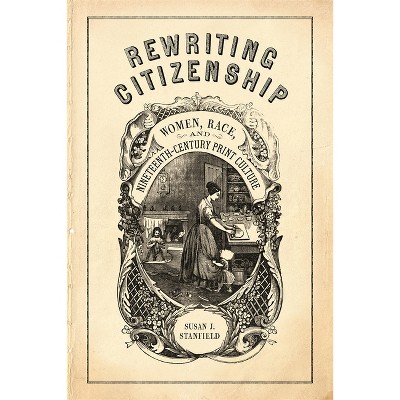$29.95 sale price when purchased online
$34.95 list price
Target Online store #3991
About this item
Highlights
- In this deep dive into the Jamaican music world filled with the voices of creators, producers, and consumers, Larisa Kingston Mann--DJ, media law expert, and ethnographer--identifies how a culture of collaboration lies at the heart of Jamaican creative practices and legal personhood.
- Author(s): Larisa Kingston Mann
- 242 Pages
- Music, Genres & Styles
Description
About the Book
"In this deep dive into the Jamaican music world filled with the voices of creators, producers, and consumers, Larisa Kingston Mann-DJ, media law expert, and ethnographer-identifies how a culture of collaboration lies at the heart of Jamaican creative practices and legal personhood. In street dances, recording sessions, and global genres such as the riddim, notions of originality include reliance on shared knowledge and authorship as an interactive practice. In this context, musicians, music producers, and audiences are often resistant to conventional copyright practices. And this resistance, Mann reveals, goes beyond cultural concerns. Because many working-class and poor people are cut off from the full benefits of citizenship on the basis of race, class, and geography, Jamaican music spaces are an important site of social commentary and political action in the face of the state's limited reach and neglect of social services and infrastructure. Music makers organize performance and commerce in ways that defy, though not without danger, state ordinances and intellectual property law and provide poor Jamaicans avenues for self-expression and self-definition that are closed off to them in the wider society. In a postcolonial world, how creators relate to copyright reveals how people will play outside, within, and through the limits of their marginalization"--Book Synopsis
In this deep dive into the Jamaican music world filled with the voices of creators, producers, and consumers, Larisa Kingston Mann--DJ, media law expert, and ethnographer--identifies how a culture of collaboration lies at the heart of Jamaican creative practices and legal personhood. In street dances, recording sessions, and global genres such as the riddim, notions of originality include reliance on shared knowledge and authorship as an interactive practice. In this context, musicians, music producers, and audiences are often resistant to conventional copyright practices. And this resistance, Mann shows, goes beyond cultural concerns.Because many working-class and poor people are cut off from the full benefits of citizenship on the basis of race, class, and geography, Jamaican music spaces are an important site of social commentary and political action in the face of the state's limited reach and neglect of social services and infrastructure. Music makers organize performance and commerce in ways that defy, though not without danger, state ordinances and intellectual property law and provide poor Jamaicans avenues for self-expression and self-definition that are closed off to them in the wider society. In a world shaped by coloniality, how creators relate to copyright reveals how people will play outside, within, and through the limits of their marginalization.
Review Quotes
"By questioning the fundamental underlying assumptions in Western conceptions of musical and sonic composition with examples from Jamaican popular music, Mann's provocation in Rude Citizenship asks readers to question their understanding of auteurship, originality and notions of musical talent."--Dancecult: Journal of Electronic Dance Music Culture
"Rude Citizenship is thought-provoking and raises questions for future investigation regarding how disadvantaged populations from Jamaica and other postcolonial societies resist existing power imbalances by engaging with musical practices to flourish."--International Journal of Communication
"Interesting, thought-provoking and stimulating. It will guide you through a journey to discover the beauties and secrets of Jamaican music, from the mento of the 50s to the modern era."--Sonic Street Technologies
"The concept of the original . . . crystalizes much of the important work Rude Citizenship does: understanding Jamaican practices of music-making on their own terms; emphasizing how, in this context, creativity is understood as relational; and working through the legal tensions that result. The book is of interest to scholars approaching music through cultural studies of law, contextually-specific conceptualizations of creativity, or 20th and 21st century Jamaica."--Popular Music
"This book presents scholars and music lovers alike with a powerful interdisciplinary investigation of how Jamaican popular music enables the island's oppressed classes to resist the predations of postcolonial society. Using the lens of copyright law and its ability to define culture as property owned by individuals, Larisa Mann exposes the inadequacies of copyright's legal framework to render visible Jamaican popular music practices."--New West Indian Guide
Dimensions (Overall): 9.21 Inches (H) x 6.14 Inches (W) x .55 Inches (D)
Weight: .84 Pounds
Suggested Age: 22 Years and Up
Number of Pages: 242
Genre: Music
Sub-Genre: Genres & Styles
Publisher: University of North Carolina Press
Theme: Pop Vocal
Format: Paperback
Author: Larisa Kingston Mann
Language: English
Street Date: March 29, 2022
TCIN: 88966527
UPC: 9781469667249
Item Number (DPCI): 247-11-0740
Origin: Made in the USA or Imported
If the item details above aren’t accurate or complete, we want to know about it.
Shipping details
Estimated ship dimensions: 0.55 inches length x 6.14 inches width x 9.21 inches height
Estimated ship weight: 0.84 pounds
We regret that this item cannot be shipped to PO Boxes.
This item cannot be shipped to the following locations: American Samoa (see also separate entry under AS), Guam (see also separate entry under GU), Northern Mariana Islands, Puerto Rico (see also separate entry under PR), United States Minor Outlying Islands, Virgin Islands, U.S., APO/FPO
Return details
This item can be returned to any Target store or Target.com.
This item must be returned within 90 days of the date it was purchased in store, shipped, delivered by a Shipt shopper, or made ready for pickup.
See the return policy for complete information.






